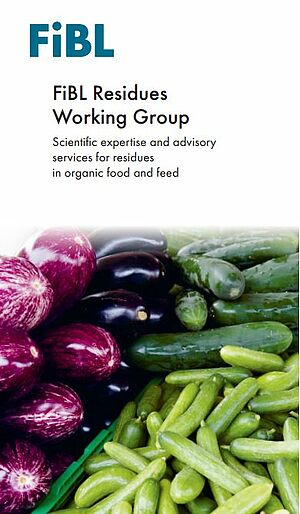About us
The FiBL Residues Working Group provides scientific expertise and advisory services for all questions relating to residues in organic food and feed and develops solutions to ensure the integrity of the organic sector.
Organic farming prohibits the use of synthetic pesticides. However, due to the widespread and intensive use of these substances in conventional production, traces of synthetic pesticides as well as other contaminants sometimes end up in organic products.
The new EU organic legislation requires operators at every stage of production, preparation and distribution to take precautionary measures to avoid the presence of unauthorised substances. Identifying potential risks and defining adequate precautionary measures requires expert knowledge from farmers, processors, traders, retailers, certifiers and authorities. Experience shows that not all actors have the same level of know-how and need more guidance on the practical implementation of the EU organic regulation. At the moment the handling and follow-up on residue cases in organic food and feed are not always harmonised across the EU.
Sampling and analysis have become important tools for quality assurance, as well as to protect organic production against fraud. However, many residue cases are not related to fraud, and the identification of the most likely causes is challenging and requires expert knowledge. Residue values are only meaningful if the samples have been taken appropriately and analysed with appropriate methods.
FiBL has developed long-standing expertise in the field of residues and contaminants and can provide science-based solutions and support to different stakeholders. In order to address the unsatisfactory situation for the entire supply chain of organic food and feed, FiBL has initiated the Residues Working Group.
Our expertise
- Identification of contamination pathways along the supply chain, e.g. from packaging materials, machinery or pest control activities
- Identification of preventive measures and in-depth analysis of unavoidable contamination values
- Background information on selected substances such as phosphonate, biphenyl, anthraquinone, chlorpyrifos, o-phenylphenol, phosphine, mineral oils (MOSH, MOAH, POSH) as well as substance related metabolites
- Identification of Crops, food and feed at risk
- Methodological advice on sampling and analysis
- Risk assessment in relation to contamination with unauthorized substances
- Assessment of risk-management practices
Our services
We provide tailor-made solutions for different needs and cases to different target groups,
farmers, processors, retailers, traders, control bodies/certifiers, authorities.
The services are provided to individuals and groups.
- Consultancy and advice
- Factsheets providing background information
- Training, training materials
- Technical guidance for target stakeholder
For other specific inquiries, you can contact us directly.




